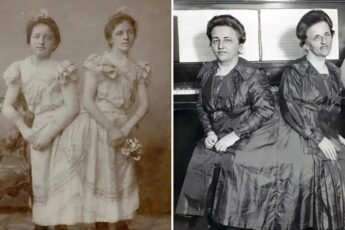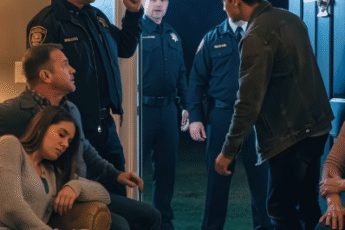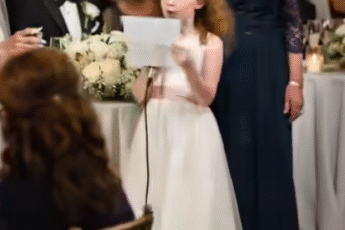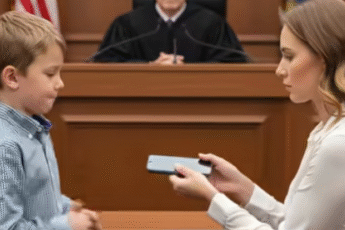I was holding a paper plate with half-eaten cupcakes when my mother’s voice cut through the laughter and clinking of plastic cups. She was standing near the baby gift table, champagne glass in hand, smiling sweetly as she delivered a sentence that punched me in the stomach in front of a room full of family and strangers. “At least this baby has a father,” she said, her tone smooth as silk but sharp as glass.
A few people chuckled awkwardly. Others went silent. My eyes locked with hers for just a second, and I saw it: the cold satisfaction she always wore when she thought she’d put me in my place. Before I could even react, my aunt Denise, my mom’s sister and her lifelong partner in passive-aggressive warfare, laughed and added, “Unlike her sister’s bastard child.” Her voice was loud enough to make sure everyone heard it.
I froze. The paper plate in my hand bent under the pressure of my grip. I couldn’t breathe. I couldn’t move. My 9-year-old son, Eli, had been just behind me, excitedly hovering near the punch bowl with the small gift bag he’d picked out himself. He heard every word. And before I could blink, before I could collect myself, he walked past me with that bag in his hand, straight toward my mother.
“Grandma,” he said, his voice steady, small fingers gripping the bag tightly. “I got something for you. Dad told me to give you this.”
The entire room went dead quiet.
My name is Zara. I’m 28. I’m a single mom, and I’ve been raising my son, Eli, on my own since he was a baby. His father, Jordan, died just a year after Eli was born from complications from a heart condition that came out of nowhere. We were young, scared, but in love. When he died, a part of me was buried with him.
Since then, it’s just been me and Eli. We’ve been through it all together—moving, struggling, late nights, hand-me-downs, scraped knees, and laughter in small kitchens. He’s my world. But my family never saw it that way. They saw a girl who got pregnant too young, a girl who made a mistake. Especially my mom, Marlene. She never forgave me for not marrying someone else after Jordan died, for not fixing the shame she thought I brought to her name. To her, being a single mother is worse than being widowed. It’s weakness. It’s failure. It’s proof that I didn’t do things the “right way,” like my younger sister, Kiara.
Kiara, the golden child. The one who waited, who got married, who invited me and Eli to her baby shower with a cute little invite that said, “Auntie Zara and cousin Eli.” I remember holding that invitation and feeling hopeful. Maybe this time, things would be different.
We arrived at the shower with a handmade blanket I’d stayed up three nights sewing and a book Eli chose himself, Love You Forever, because he said he wanted his baby cousin to know how to love their mommy. But none of that mattered once my mother opened her mouth. All it took was two cruel, calculated lines, one from my mother, one from her sister. And in that moment, I felt smaller than I’d felt in years.
But my son didn’t. He didn’t cry. He didn’t flinch. He didn’t hide. He stood up. He walked. He spoke. And what he gave her, what he gave all of them, was something they never expected.
The morning of my sister’s baby shower, my stomach was twisted in knots. I didn’t want to go. My relationship with my family has always been complicated. My mom, Marlene, raised us with a strict hand and a sharper tongue. Appearances mattered more than anything. Reputation, order, respectability. Kiara learned how to play that game early on. I didn’t. I was the rebel, the one who got pregnant at 19 and shamed her in front of the church. Even after Jordan died, I was never treated with grace. No embraces, no casseroles dropped off, just tight-lipped condolences and eventually, silence.
Still, I showed up because Kiara asked, because Eli wanted to be there, and because a naive, hopeful part of me thought this could be the start of something different.
The shower was at a local community hall, and when we stepped inside, the first thing I saw was how beautiful it all looked. Gold balloons, delicate streamers, and a banner that read, “Welcome, baby Amara.” For a second, I let myself believe we might have a good day.
Kiara greeted us with a big hug. She looked radiant, her belly popped, glowing in a way I never was when I was pregnant. My pregnancy was seen as a stain, not a celebration. I wasn’t given parties or presents. But I was happy for her. Honestly, I’ve never envied my sister’s life. I just wished I didn’t feel like a ghost in her world.
We found a table near the back. Eli was immediately drawn to the snack table. I could feel the glances, the quick smiles that didn’t reach the eyes. I was used to it. But what surprised me was how Eli didn’t seem to notice. He laughed when someone made a balloon animal. He waved at Kiara when she passed. He clutched that little gift bag in his hands like it held something sacred. He had tucked something inside that I hadn’t seen yet, something he said he wanted to give to Grandma. I didn’t think twice.
I remember watching my sister open her gifts, glowing under the soft lighting. Then it was our turn. Kiara pulled our gift bag toward her. She smiled as she pulled out the baby blanket. “Zara, this is beautiful,” she said with genuine warmth. Then she found the book Eli had picked. “Oh, this one makes me cry every time,” she said, holding it up. “Thank you, Eli.”
The moment was short-lived. My mother stood up, a glass of champagne in her hand and the smile of someone who always saves her sharpest blade for dessert. She cleared her throat. “Before we move on,” she said, her voice syrupy and loud, “I just want to say how proud I am of Kiara. She’s doing everything right. She waited. She built a home. She married a good man, and now she’s bringing a baby into a stable, two-parent family, the way it’s supposed to be.”
I felt the first sting of shame tighten around my chest. Then came the knife.
“At least this baby has a father,” she added, looking directly at me.
My heart stopped. And as if that weren’t enough, my aunt Denise let out a sharp, high-pitched laugh and added, “Unlike her sister’s bastard child.”
The word echoed in my ears. Bastard. It hit me like a brick. I felt every pair of eyes glance in my direction, then quickly look away. No one said anything. No one stood up for me. Not Kiara, not my cousins, not a single soul. And worst of all, Eli heard it. I felt his small body stiffen beside me. I could barely breathe. I was humiliated, but more than that, I was furious at how easily they reduced my son, my bright, kind, beautiful boy, to a slur.
I wanted to scream, to storm out, to tell them how Jordan, his father, had died. But I knew if I did, they’d spin it as another outburst, another sign that I was emotional, unstable, dramatic. I just sat there, numb.
And then I saw Eli stand up. He picked up the small gift bag he had kept aside, the one labeled To Grandma in his blocky handwriting.
I reached for him instinctively. “Baby, don’t,” I whispered.
But he shook his head gently, his eyes locked on my mom. “I got something for you, Grandma,” he said, walking toward her. “Dad told me to give you this.” The entire room turned silent.
I watched Eli walk across the room like the weight of the world wasn’t resting on his tiny shoulders. His back was straight, chin up, steps steady. He shouldn’t have had to carry this moment, but there he was, standing in front of my mother, his grandmother, holding out a small white gift bag with a red bow.
My mother took the bag from his hand and pulled out two items. The first was a framed photo. She stared at it, confused, and then her mouth pressed into a thin, hard line. The photo was of me and Jordan, taken just a few weeks before his surgery. We were sitting on the grass in a park, our hands intertwined over my pregnant belly. I was 19, he was 21. There was so much love in that picture it hurt to look at.
Underneath that photo, folded neatly, was a letter. Not from Eli, but from Jordan. I watched her eyes scan the page. I saw something flicker in her expression—discomfort, maybe even guilt. It was brief, but I caught it.
Advertisement: 0:43
Close PlayerUnibots.com
That letter was something Jordan had written before his surgery, just in case. I didn’t know Eli had it. I barely remembered it existed. He must have found it in the shoebox where I kept old letters and photos. I couldn’t bring myself to open it, but my son had. And somehow, he had known that this moment was the right time for it.
My mother read silently, but I could imagine every word. Jordan had written about how proud he was of me, how scared he was, but how sure he was that I would be an amazing mother no matter what. He called Eli our miracle. He told me that no matter how the world judged me, I should never forget that I was enough, more than enough, and that anyone who made me feel otherwise was wrong. It wasn’t dramatic. It wasn’t angry. It was pure.
For the first time in a very long time, I saw the people in that room stop and look at me differently. No one spoke. Even Aunt Denise had nothing to say.
Then Eli, my little boy, looked right at my mother and said, “He loved me. He loved my mom. That means I’m not a mistake.”
There was no anger in his voice, no shame, just truth. And in that moment, the power in the room shifted. My mother blinked quickly, her lips parting like she wanted to say something, but nothing came out. She just stood there, holding a letter from the son-in-law she had never acknowledged, forced to face the reality she spent nearly a decade pretending didn’t exist.
Eli turned around and walked back to me. I knelt down and hugged him so tightly, I thought I might never let go. I didn’t have to fight back. He already did it for me.
My mother stood there, still holding the letter and the photo, looking small. The room was completely silent. I could feel the air shift as people became uncomfortable, unsure where to look. Jordan hadn’t fit her version of what a “real man” should be. He wasn’t rich. He was a kind, gentle musician. But he had held my hand through pregnancy appointments, written lullabies to my growing belly, and cried the first time he heard Eli’s heartbeat. To her, that didn’t count because he died, because we didn’t get married, because we didn’t follow her rules. Now she was face to face with a letter that proved her narrative had been a lie, and everyone saw it.
My cousin Kayla slowly lowered her phone, which she had been recording with. Even Kiara, my sister, was crying—quiet tears that rolled down her cheeks as she stared at her mother with a look of disappointment, or maybe just realization.
And then Eli, still standing beside me, said one more thing, loud enough for the whole room to hear. “My dad died, but he was real, and he loved me. And my mom. That’s what matters.”
Simple words, but they were everything. I stood up slowly, my hands shaking. I looked at Marlene. For the first time in my life, I didn’t feel the need to make her comfortable. I didn’t apologize for the awkward silence. I just stood there, tall, visible, whole, and I said, “You don’t ever get to speak about my son like that again.”
She blinked, her lips parted, but I kept going. “You ignored him because you hated how he came into this world. But you forgot one thing: he didn’t ask to be here. We chose him. His father loved him. I love him. He’s not a mistake. He’s the best thing that ever happened to me.”
My voice wasn’t loud, but it didn’t need to be. The truth didn’t need a megaphone. I reached for Eli’s hand. He took it without hesitation. Then I turned to Kiara. “Congratulations,” I said softly. “Really. I hope your child is surrounded by love. All kinds of love. Even the kind that doesn’t fit in neat little boxes.”
She nodded, the words caught in her throat.
We walked out together, hand in hand, with every eye in the room following us. Not out of pity, but something else: respect. No one stopped us. As we stepped into the sunlight, I felt a peace I hadn’t felt in a long time.
The car ride home was quiet. When we pulled into our apartment complex, I parked and just sat there.
“Are you mad I gave Grandma the letter?” he asked softly.
I turned to face him. “Mad? No, baby. I’m not mad.”
He looked down. “I just… I didn’t like what she said. I wanted her to know my dad was real.”
Tears welled up before I could stop them. “You did something really brave. I’m so proud of you.”
I wasn’t broken. I wasn’t less than. I wasn’t defined by who stayed or who left or who died. I was defined by the life I built.
The next day, I found the shoebox where Eli had taken the letter and photo from. I sat on my bedroom floor with that box and cried for the first time in a long time. Not because I was sad, but because I finally let myself feel everything I’d pushed down for so long.
I had spent years trying to be invisible, biting my tongue every time someone made a comment. But that day, something changed. It was about finally seeing myself through Eli’s eyes. He never saw me as a failure or a burden. He saw me as his mom, the person who taught him how to make grilled cheese and held him through every storm. And he was proud of me. That was enough.
In the weeks that followed, I didn’t hear much from my mother. She sent a text a few days later: That was unnecessary. We could have handled it privately. I didn’t respond. But something surprising happened. My cousin Kayla messaged me: “I just want you to know that was powerful. I think you’re an amazing mom.” She wasn’t the only one. People I hadn’t spoken to in years sent messages, some sharing their own stories of being single parents or having families that never accepted them.
It didn’t erase the pain, but it helped me let go of needing validation from people who refused to give it. I started therapy, not because I was falling apart, but because I finally wanted to build something new for myself, for Eli.
And Kiara, she called a week after the shower. She cried. She apologized. She said she hadn’t known what to say in the moment and that she hated herself for staying quiet.
“I don’t need you to defend me,” I told her. “I need you to stop being silent.”
We’re rebuilding, slowly, carefully. Because healing isn’t about forgetting. It’s about choosing who gets to come with you when you decide to stop surviving and start living. So here I am, not perfect, not polished, but free. And when I look at Eli, his whole life ahead of him, his heart still open, I know this: I didn’t raise a mistake. I raised a mirror. And when he stood up for me, I finally saw who I really was.





